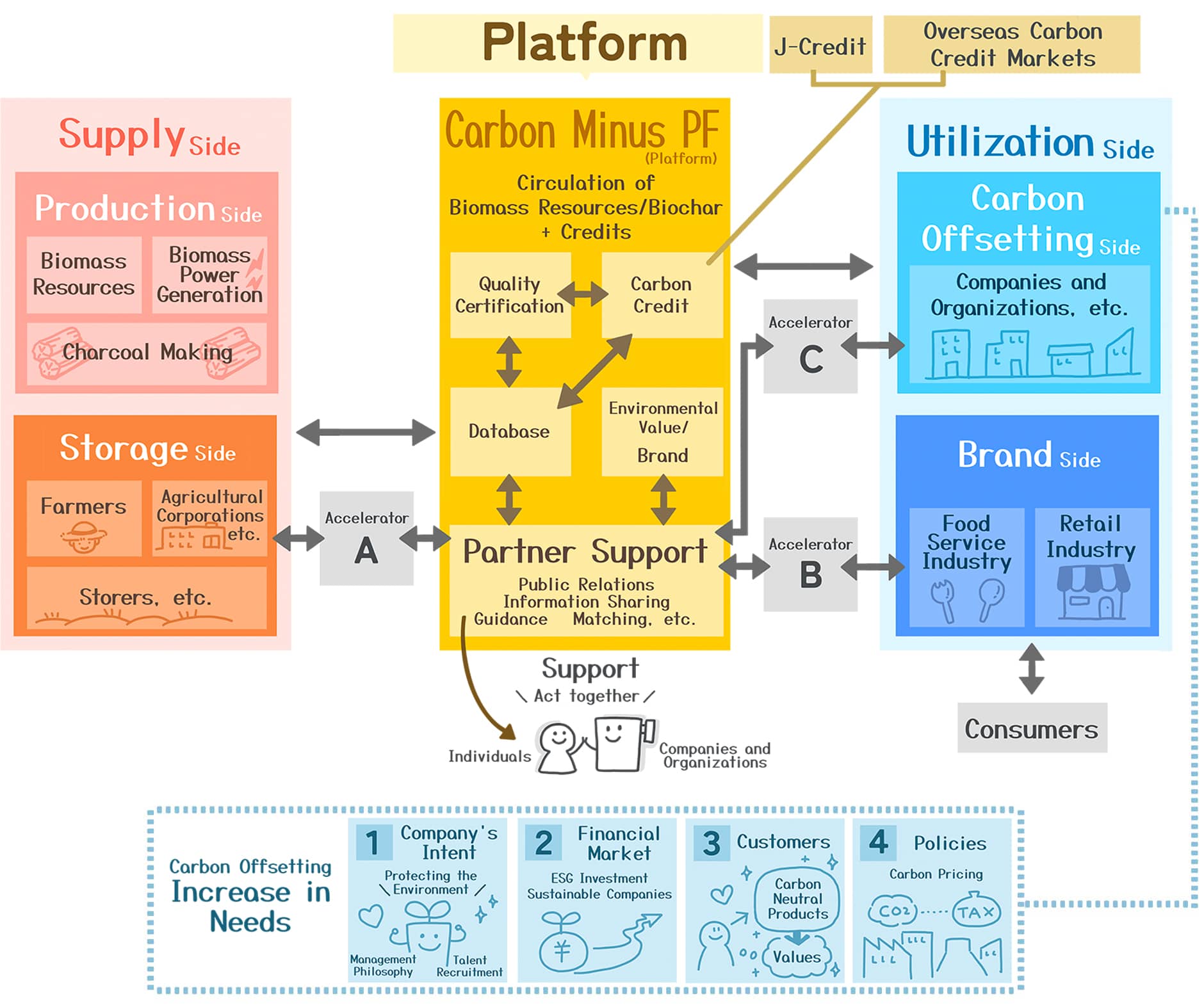The establishment of the Japan Biochar Research Center at Ritsumeikan University marks the full-blown commencement of initiatives aimed at establishing a carbon-negative society using biochar. Leveraging his expertise in business management, Yuichi Yoda designs platforms and business ecosystems as comprehensive visions for social implementation, contributing to the realization of a decarbonized society.
Implementing Carbon-Negative Solutions in Society Using Biochar
In November 2022, the Japan Biochar Research Center was inaugurated as a base for socially implementing carbon negativity to combat global warming by utilizing biochar. This initiative kickstarts the construction and promotion of a carbon-negative platform and ecosystem facilitated by biochar. Carbon-negative is also called carbon-minus in many circles.
To effectively mitigate CO₂ levels on Earth's surface, it is imperative to address not just the reduction of CO₂ emissions, but also the removal of existing CO₂. Biochar is recognized as an effective method for carbon removal, capable of sequestering CO₂ from the air over the long term, as acknowledged by the “2019 Revised Intergovernmental Panel on Climate Change (IPCC) Guidelines.” In September 2020, the Japanese government certified "agricultural land application of biochar" as eligible for the J-Credit system. This recognition allows for the trading of carbon credits representing the reduction or absorption of greenhouse gases as environmental value.
“With this as a tailwind, we are finally moving forward with the social implementation of biochar,” revealed Yuichi Yoda, the center’s deputy director.
Designing a Business Ecosystem and Visualizing the Overall Picture of Social Implementation
As an overarching strategy for social implementation, Yoda has designed a platform and business ecosystem aimed at achieving a decarbonized society by facilitating the circulation of biochar and J-Credits generated from biomass resources. “A platform refers to the foundation for creating new values. Its essence lies in the network effect, which produces positive effects through mutual influence without market intermediation, and the emergence of value through the integration of diverse entities. The business ecosystem, a concept born from integrating the ecosystem concept of biology into management studies, is a value creation system that can be viewed as an overall strategic perspective,” Yoda elucidated, employing strategies from management studies on platform and business ecosystem strategies to draw an abstract model.
The necessity of showcasing such a model lies in “visualizing the roles of all participants within the ecosystem,” Yoda explains. “This allows everyone to share the overall image of the value creation system and strategic perspective. Due to cognitive limits, it’s challenging to foresee the impact of one’s initiatives entirely; a model would help recognize one’s role and understand necessary collaborations, enabling participants to deepen their cooperation and expand their initiatives. Moreover, if other organizations referred to this model for their social implementations, it could serve as a blueprint, contributing to carbon negativity through biochar across Japan.”
Organizing and Informating to Extend the Ecosystem
The business ecosystem envisioned by Yoda categorizes the biochar ecosystem into the supply and utilization sides via a platform. On the supply side, it encompasses the production sector (comprising biochar producers and sellers) and the storage sector (comprising farmers, agricultural corporations, etc., who utilize biochar). By using unused biomass resources as raw materials, biochar is produced by carbonization machine or as a byproduct of biomass gasification power generation and applied by farmers or agricultural corporations for carbon storage, thereby achieving carbon negativity.
On the utilization side, there are carbon offsetting users (companies, organizations, etc.) and brand users (food and beverage industries, retailers, or food manufacturers using environmentally friendly crops that promote environmental conservation). Companies and organizations purchase carbon credits for their carbon offsetting. “With an increase in businesses aiming to ‘protect the environment’ and the rise of ESG investments in financial markets, being a sustainable company has become important. Furthermore, policies promoting decarbonization, like carbon pricing, and the anticipated increase in the value of carbon-neutral products suggest a growing demand for carbon offsetting going forward,” he says. Additionally, on the brand utilization side, crops produced on lands treated with biochar, which also improves soil, are branded and offered to consumers through food and beverage industries and retailers.
Furthermore, to enhance the functionality of the business ecosystem, he established a platform that connects participants and fosters the ecosystem’s growth. Yoda designed mechanisms for certifying biochar quality, supporting and mediating carbon credits, quantifying and databasing carbon negativity, and managing brands of environmentally friendly crops that promote sustainability.
“The immediate step after model construction is organization for social implementation,” states Yoda. In collaboration with industry, government, academia, and the public, the Japan Biochar Consortium was established in December 2022. The research center takes a leading role, coordinating with companies, organizations, and farmers to organize participants for their respective roles.
Moreover, to efficiently foster the business ecosystem, it is imperative to establish an information system leveraging digital technology. “We will meticulously quantify the carbon negative impact resulting from biochar application in agriculture and store this data in a database. We also establish a traceability system to monitor the biochar producers, their applied locations, and even the buyers of the carbon credits. This information will be presented visually on the web for easy access and transparency. By harnessing digital technology through DX (Digital Transformation), we aim to drive GX (Green Transformation).”
A distinctive feature of Yoda’s model is its local business ecosystem orientation. The production and application of biochar, as well as the consumption of agricultural products, are ideally implemented locally—this not only benefits regional and agricultural development but also addresses environmental and economic concerns related to CO₂ emissions. Despite its local focus, the model holds potential for global value sharing through carbon credits. Yoda explains, ‘We plan to horizontally expand region-specific models nationwide while also taking these models to a global scale through the marketing activities of participants who utilize the produced agricultural products and credits.’ As he pursues the further expansion of the platform and business ecosystem, he aims to realize a decarbonized society.
Carbon-Negative Ecosystem
